Bury
Explore hidden histories, historic photos, and things you never knew about Bury from the collections and archives of Historic England.
Discover your local listed buildings and places
Introducing some of Bury's most historic sites, included in the National Heritage List for England. Some of these captions have been summarised by AI. Click through for the official List entry. Skip this section and go to place by numbers
Lancashire Fusiliers Boer War Memorial
Bury
Boer War Memorial of 1905, relocated in 1920, by Sir George James Frampton, comprising a sandstone plinth with bronze inscriptions and a realistically-depicted statue of a soldier in 'review...
Church of St Mary
Prestwich
Church of St Mary, Prestwich, dating back to the 15th century, features significant 19th-century additions, a historic parish church with medieval and 19th-century elements.
Bury War Memorial
Bury
First World War memorial. Erected in 1924, by William Kirkpatrick Ltd, and incorporating two bronze plaques by Hermon Cawthra.
War Memorial to the Lancashire Fusiliers, Gallipoli Gardens
Bury
First World War memorial to the Lancashire Fusiliers, 1922, with additional later inscriptions. Obelisk design in Portland stone by Sir Edwin Landseer Lutyens.
The Rectory
Prestwich
Rectory, 1923, by Taylor & Young of Manchester, Neo-Georgian and Arts & Crafts influences.
Brooksbottom Mill
Bury
A cotton spinning mill, later with integrated weaving and now in residential use, with late-C18 origins, extended and re-fronted in the late C19 and considerably reduced in the late C20, by...
Ramsbottom Co-operative Hall
Ramsbottom
Co-operative hall, offices and shops, 1874 to 1876 to designs by Bird and Whittenbury for the Ramsbottom Industrial and Provident Society.
Grave Slab of Mary Lancashire in Churchyard of Church of …
Prestwich
Grave slab commemorating Mary Lancashire and family, c1672, continued use by same family in C18 & C19.
Monument to John Brooks to West of Church of St Mary
Prestwich
Monument to John Brooks (1788-1849) and his wife (d. 1851), c1851, by the sculptor and architect John Thomas.
Ramsbottom War Memorial
Ramsbottom
War memorial commemorating the First and Second World Wars, 1950.
Parish Church of Saint Mary
Bury
The Parish Church of Saint Mary in Bury, rebuilt in the 19th century by E H Shellard and J S Crowther, features a lofty interior with fine woodwork and decorative mosaics.
Boundary Stone at SD8090601825 at the Junction With Singl…
Salford
Boundary stone. 1853. Ashlar. Triangular plan. Inscribed "SALFORD/ PRESTWICH" and on chamfered top "BOUNDARY STONE".
Bury Cemetery War Memorial
Bury
First World War memorial of the 1920s, after Sir Reginald Blomfield's 'Cross of Sacrifice' design.
Prestwich War Memorial
Prestwich
A temporary First World War Memorial of around 1918, relocated around 1970, comprising a timber cross with stopped chamfers and pegged joints, set on a base of two concrete steps with added...
Unsworth War Memorial
Bury
War Memorial of 1923 with additional names of the Second World War, comprising an octagonal cross with wreath and sword, on a stepped base with inscriptions, executed in pale cream stone.
Brookhouse Farm barn
Ramsbottom
A vernacular barn of C18 origin, built of watershot buff sandstone with stone flag roofs.
Ashworth Grave Slab in Churchyard of Church of St Mary
Prestwich
Grave slab commemorating Katherine Ashworth and her children, c1668.
Hardman Grave Slab in Churchyard of Church of St Mary
Prestwich
Grave slab commemorating Ralph Hardman and his daughter, c1695, re-used in the early C20.
Ramsbotham Family Grave Slab in Churchyard of Church of S…
Prestwich
Grave slab of Edmund Ramsbotham, c1697, later inscriptions added in C19.
Diggles Table Tomb in Churchyard of Church of St Mary
Prestwich
Table tomb of Mary Diggles, c1804, re-used in the mid-late C19.
Barlowe Grave Slab in Churchyard of Church of St Mary
Prestwich
Grave slab commemorating George Barlowe and family, c1686, later C18 and C19 inscriptions.
Holland Grave Slab in Churchyard of Church of St Mary
Prestwich
Grave slab commemorating Margaret Holland and her daughter, c1687.
Grave Slab of James Lancashire in Churchyard of Church of…
Prestwich
Grave slab commemorating James Lancashire and his family, c1737.
Hearse House in Churchyard of Church of St Mary
Prestwich
Hearse house, 1801 with later alterations.
James Grimshaw Grave Slab in Churchyard of Church of St Mary
Prestwich
Grave slab of James Grimshaw and family, c1686.
Mason Family Grave Slab in Churchyard of Church of St Mary
Prestwich
Grave slab of John Mason and his family, c1671, continued use by the same family in the C18.
Scholefeild Grave Slab in Churchyard of Church of St Mary
Prestwich
Grave slab commemorating James Scholefeild and Thomas Scholes, c1670, re-used by another family in the C18.
War Memorial, St Mary's Churchyard
Prestwich
First World War memorial, 1921, by Isaac Taylor of Taylor & Young, with Second World War dates added later. Portland stone cross with a bronze sword.
Barrack Fold Farmhouse
Bury
Barrack Fold Farmhouse and barns form a group, dating to the C17 and C18, with C19 alterations, ranged around a rectangular courtyard.
Gate Piers and Boundary Walls to Churchyard Of St Mary
Prestwich
Gate piers of c1827 and boundary walls of 1827 and 1886 enclosing St Mary's churchyard to north, east and south sides.
Bury Bridge
Bury
Road bridge, of medieval origins with late-C18, mid-C19, late-C19 and late-C20 alterations and additions.
Old White Lion
Bury
Public house with accommodation above, built in the late C19 on the site of an earlier inn. Extended to the rear in the mid-C20.
Explore more
Search for more listed placesBury through time
This timeline shows the first period of use for buildings and places on the National Heritage List for England, just one of the details recorded for every list entry. Click around to see how Bury changes over time. Skip this section and go to aerial photos
Prehistoric Before AD 43
Prehistory covers a million years of human occupation before the Roman invasion, from hunter-gatherers of several human species, including Neanderthals, to more recent herders and farmers. It was a time of developing technologies and belief systems, involving contact with and migration from Europe, all reflected in the variety of artefact and monument types characteristic of particular prehistoric periods.
We don't have an image for any of these list entries yet
Medieval AD 1066 to AD 1540
This period, sometimes known as the Middle Ages, began with the Norman invasion in AD 1066. It saw a significant rise in military and defensive buildings such as castles and earthworks, as well as religious houses dominating a largely agricultural landscape.
The monarchy and Church dominated the period, which also saw the break with the Roman Catholic Church and the English reformation.
Post medieval AD 1540 to AD 1901
The Post-Medieval period brought seismic changes to life in England, with religious reformation leading to the democratization of worship and the destruction of hundreds of religious houses.
In parallel, there was a huge expansion of scientific study and enlightenment that permanently altered the nation's social structure and landscape. Industrialization and mass production lead to wider global trade, emigration, and immigration.
20th century AD 1901 to AD 2000
The 20th century saw an incredible expansion of England's transport networks, with suburban growth shadowing rapid infrastructural expansion. The establishment of state schools, hospitals, and modern technical colleges, with new architectural styles, radically changed the appearance of towns and cities.
Two catastrophic world wars and the 1918 pandemic also brought unprecedented change, altering England's built environment and social structures forever.
Prehistoric Before AD 43
Prehistory covers a million years of human occupation before the Roman invasion, from hunter-gatherers of several human species, including Neanderthals, to more recent herders and farmers. It was a time of developing technologies and belief systems, involving contact with and migration from Europe, all reflected in the variety of artefact and monument types characteristic of particular prehistoric periods.
We don't have an image for any of these list entries yet
Medieval AD 1066 to AD 1540
This period, sometimes known as the Middle Ages, began with the Norman invasion in AD 1066. It saw a significant rise in military and defensive buildings such as castles and earthworks, as well as religious houses dominating a largely agricultural landscape.
The monarchy and Church dominated the period, which also saw the break with the Roman Catholic Church and the English reformation.
Post medieval AD 1540 to AD 1901
The Post-Medieval period brought seismic changes to life in England, with religious reformation leading to the democratization of worship and the destruction of hundreds of religious houses.
In parallel, there was a huge expansion of scientific study and enlightenment that permanently altered the nation's social structure and landscape. Industrialization and mass production lead to wider global trade, emigration, and immigration.
20th century AD 1901 to AD 2000
The 20th century saw an incredible expansion of England's transport networks, with suburban growth shadowing rapid infrastructural expansion. The establishment of state schools, hospitals, and modern technical colleges, with new architectural styles, radically changed the appearance of towns and cities.
Two catastrophic world wars and the 1918 pandemic also brought unprecedented change, altering England's built environment and social structures forever.
Aerial photos of Bury
Aerial photography helps reveal secrets of England's changing landscapes that are impossible to see from the ground. Skip this section and go to archive images
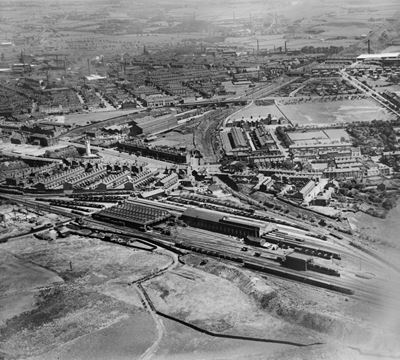
Bury
The Buckley Wells railway depot and environs, Bury, 1935

Bury
The Buckley Wells railway depot and the town, Bury, 1935
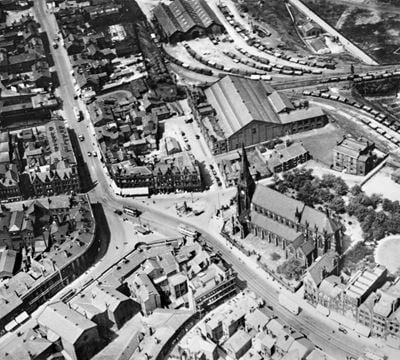
Bury
St Mary's Church, the Market Place and Castle Armoury, Bury, 1927
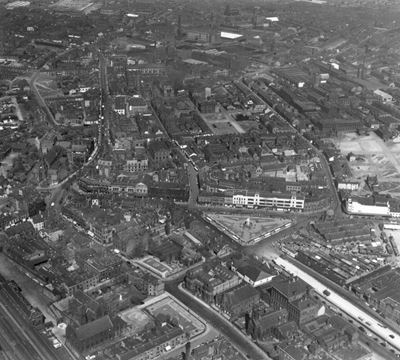
Bury
Kay Garden and the town centre, Bury, 1948

Prestwich
The Whitefield Branch Railway and environs, Prestwich, 1934
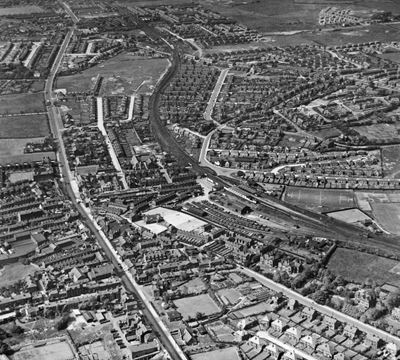
Prestwich
Prestwich Railway Station, Bury New Road and environs, Prestwich, 1935

Radcliffe
The Clifton Accrington and Colne Railway, St Thomas's Church and the town, Radcliffe, 1934
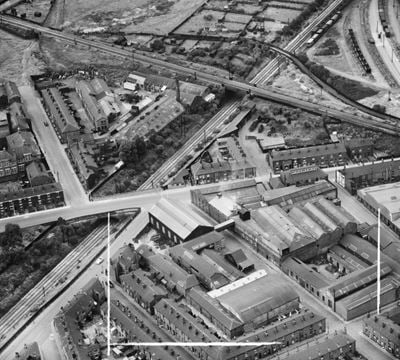
Radcliffe
The Associated Sprinkler Co Ltd Works (Globe Iron Works), Radcliffe, 1953
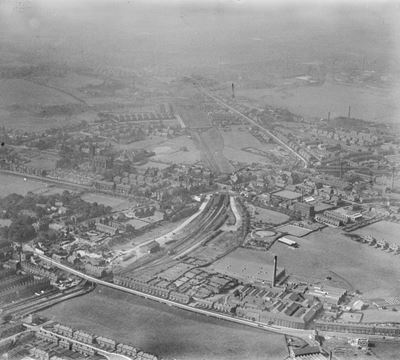
Whitefield
The Whitefield Branch Railway passing through the town, Whitefield, 1934

Whitefield
The goods yard, Bury New Road and environs, Whitefield, 1935
Bury in the Historic England Archive
The Historic England Archive cares for over 15 million images, dating from the 1850s to the present day. Discover stunning images of Bury's past. Skip this section and go to stories about heritage
John Laing Collection
Bury
Date created: 28 Feb 1963
A Sectra shutter being unloaded from a train by an overhead crane, or bridge crane, at Bury railway goods yard
Nigel Temple Collection of Postcards of Parks and Gardens
Coronation Park, Radcliffe, Bury
Date created: 1908 - 1913
GENERAL VIEW
John Laing Collection
Bury
Date created: 28 Feb 1963
A team of workers and an overhead crane unloading a Sectra shutter from a train at Bury railway goods yard, with a British Railways flatbed lorry in...
Nigel Temple Collection of Postcards of Parks and Gardens
Bury
Date created: 1904 - 1909
GENERAL VIEW
Nigel Temple Collection of Postcards of Parks and Gardens
Bury
Date created: 1901 - 1906
GENERAL VIEW LOOKING TOWARDS VICTORIAN HALF TIMBERED HOUSE
Nigel Temple Collection of Postcards of Parks and Gardens
Bury
Date created: 01 Jan 1929 - 10 Aug 1934
GENERAL VIEW SHOWING PATHWAY WITH MILL CHIMNEY VISIBLE IN DISTANCE
Nigel Temple Collection of Postcards of Parks and Gardens
Bury
Date created: 01 Jan 1904 - 10 Aug 1909
GENERAL EXTERIOR VIEW
Nigel Temple Collection of Postcards of Parks and Gardens
Bury
Date created: 1900 - 1930
VIEW LOOKING TOWARDS THE BANDSTAND
Stories about heritage in your local area
Historic England publishes news, blogs, research, videos, and podcasts celebrating England's rich heritage. Discover the stories we have about Bury. Skip this section and go to education
Malt Kilns and Malthouses
Mentions Bury
A new book tells the important story of how maltings evolved in England and looks at their future use.
Investigating the Built Environment in Lancashire’s Historic Textile Areas
Mentions Bury
Exploring the local infrastructure that underpinned the industrial revolution.
The Former Augustinian Priory of St John the Baptist, Latton, Essex
Mentions Bury
Recent research sheds new light on a previously poorly documented medieval priory at Latton, Essex, including the location of an annual fair.
Historic England Highlights Fascinating Heritage Sites Listed in 2022
Mentions Bury
As 2022 draws to a close, Historic England highlights gems added to the National Heritage List for England (NHLE) over the last 12 months.
Historic England Launches Interactive Story Map for Schools to Celebrate the Queen’s Jubilee
Mentions Bury
A resource to educate children about their local history, highlighting important sites that the Queen has visited throughout her 70-year reign.
23 Remarkable Places Listed in 2018
Mentions Bury
Historic England publishes its annual highlights from more than 900 buildings and sites listed or upgraded this year.
New Scientific Dating Research Unravels the Story of Life in Prehistoric Orkney
Mentions Bury
A new study is challenging the previously understood narrative for prehistoric life on Orkney.
National Collection of Lutyens’ War Memorials Listed
Mentions War Memorial to the Lancashire Fusiliers, Gallipoli Gardens
All 44 First World War memorials designed by Sir Edwin Lutyens are now protected by listing.
British Library Listed at Grade I
Mentions Bury
The British Library and seven local libraries across England are being listed as the best examples of public libraries of the later 20th century.
War Memorials Associated With Gallipoli Campaign Listed
Mentions Bury
War memorials listed to mark the Gallipoli Campaign centenary
Bury's social history through photos
Over 10,000 images from the Historic England Archive have been specially selected and re-captioned for teachers, students, and anyone who wants to learn more about their local area. Skip this section and go to grant-aided places
Wesleyan School, Wesley Street, Bury, Greater Manchester
Period: Victorian (1837 - 1901)
This Wesleyan Day and Sunday School is dated 1868. The foundation stone was laid on 16.05.1868 by James Barlow, Mayor of Bolton.
Wesleyan School, Wesley Street, Bury, Greater Manchester
The Dungeon, Harwood Road, Bury, Greater Manchester
Period: Georgian (1714 - 1836)
This building is dated 1835. It was used as a lockup. Before a national system of policing was set up many villages had their own lockup.
The Dungeon, Harwood Road, Bury, Greater Manchester
St Marys Church, Church Lane, Prestwich, Bury, Greater Manchester
Period: Victorian (1837 - 1901)
A group of people looking towards St Mary's Church from the graveyard to the south west. They appear to be tourists visiting the church.
St Marys Church, Church Lane, Prestwich, Bury, Greater Manchester
Peel Monument, Holcombe Hill, Holcombe, Greater Manchester
Period: Victorian (1837 - 1901)
This monument was built in 1851-2. It is in tribute to Sir Robert Peel for effecting the repeal of the Corn Laws.
Peel Monument, Holcombe Hill, Holcombe, Greater Manchester
Tags
Odeon Cinema, Rochdale Road, Bury, Greater Manchester
Period: 1930s (1930 - 1938)
This Odeon cinema opened to the public in November 1936, and the first film to be shown was 'Two's Company', with Ned Sparks.
Odeon Cinema, Rochdale Road, Bury, Greater Manchester
Odeon Cinema, Foundry Street, Radcliffe, Bury, Greater Manchester
Period: 1930s (1930 - 1938)
This Odeon cinema opened on 14th August 1937, it is seen here shortly after it was built, advertising Lionel Barrymore in 'A Family Affair'.
Odeon Cinema, Foundry Street, Radcliffe, Bury, Greater Manchester
Haymount, Holcombe Old Road, Holcombe Brooke, Ramsbottom, Greater Manchester
Period: Victorian (1837 - 1901)
A man in a top hat holding the bridle of a horse which is harnessed to a chaise, with a woman sitting on the seat of the chaise holding the reins,...
Haymount, Holcombe Old Road, Holcombe Brooke, Ramsbottom, Greater Manchester
Carriage Shed at Locomotive Works, Baron Street, Bury, Greater Manchester
Period: Victorian (1837 - 1901)
This carriage shed at Buckley Wells Locomotive Works was built in 1856. It was built by J S Perring, for the East Lancashire Railway Company.
Carriage Shed at Locomotive Works, Baron Street, Bury, Greater Manchester
Discover more
Ready for more local stories? Take a look at these other places nearby

Greater Manchester
Ceremonial County

Bolton
Local Authority District

Rochdale
Local Authority District